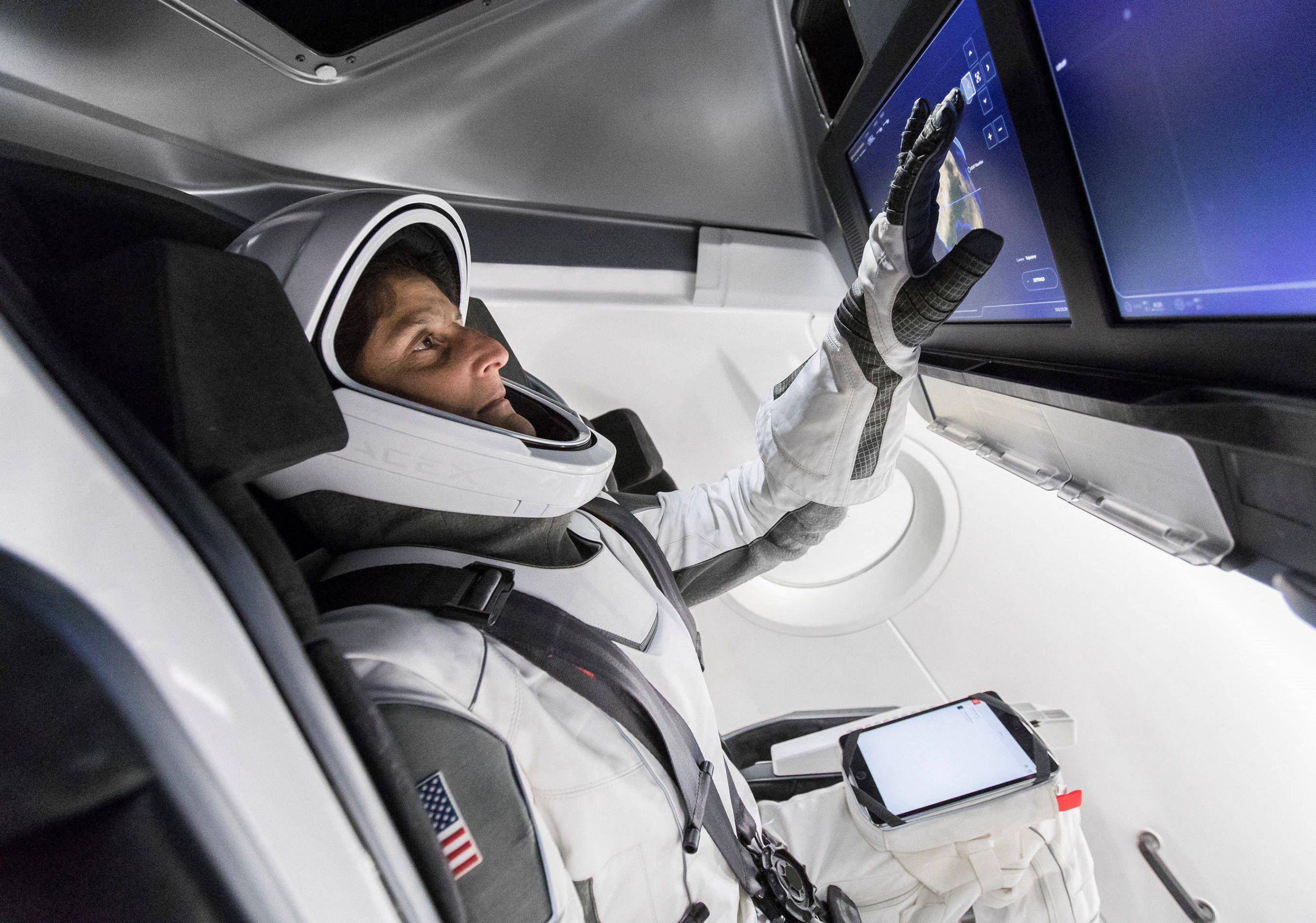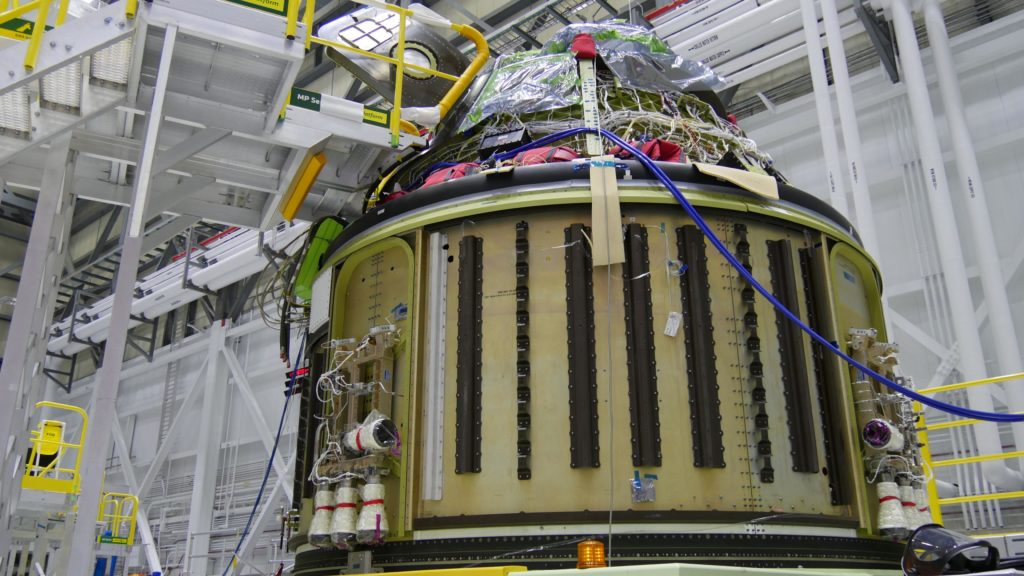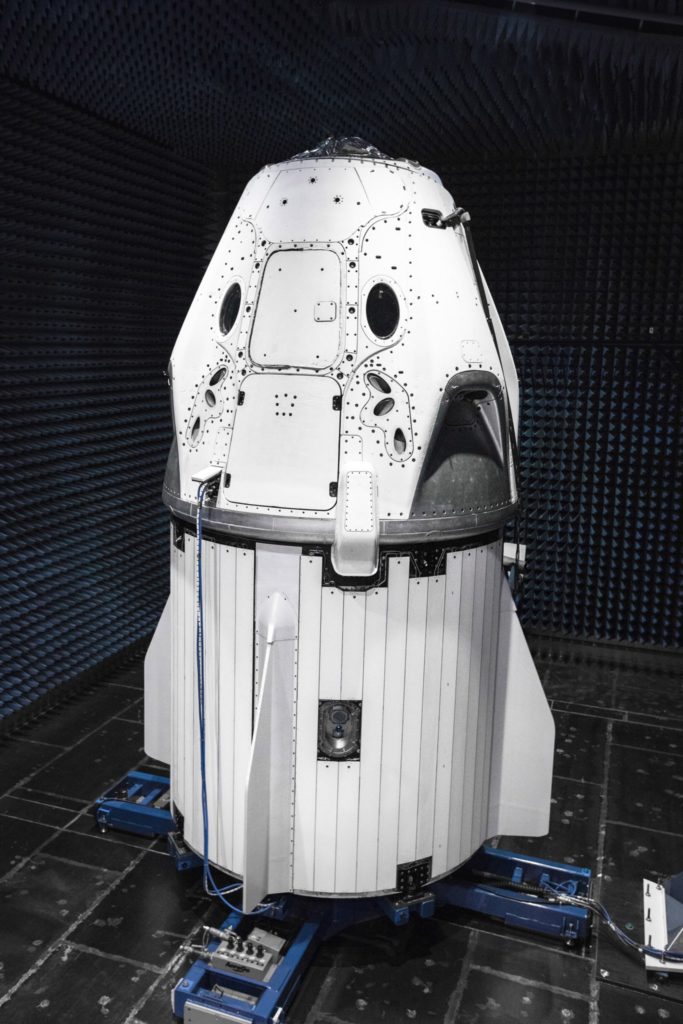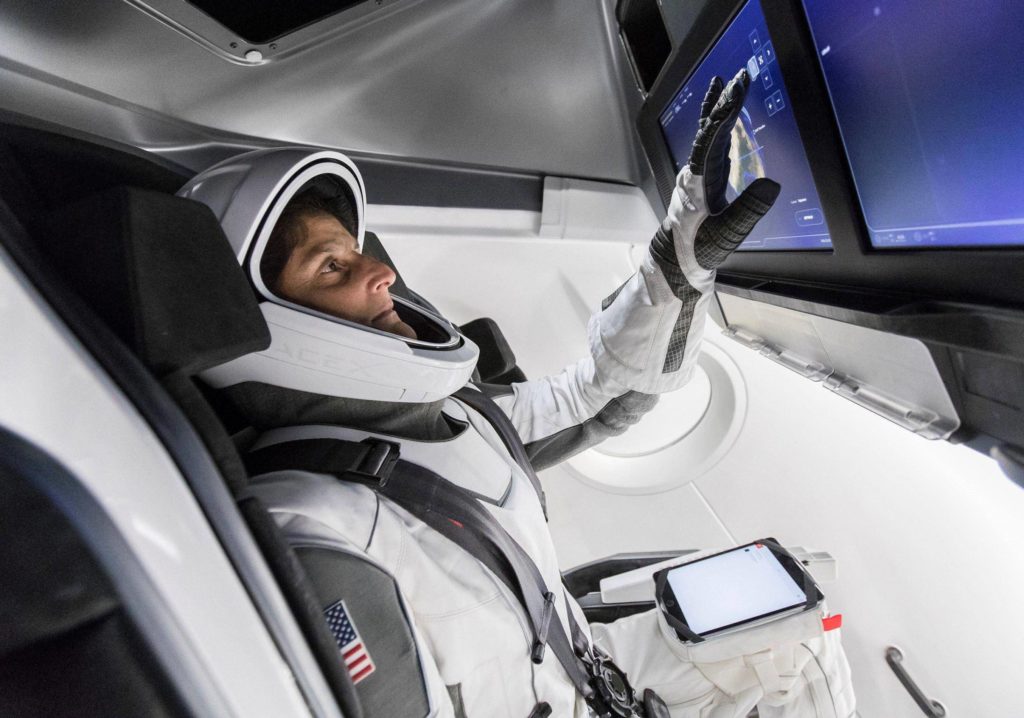

News
SpaceX releases photo of NASA astronauts testing in Crew Dragon spaceship
In a rare instance of publicity, SpaceX has given the public the first detailed glimpse of a NASA astronaut practicing inside a mockup of Crew Dragon’s cockpit, wearing a sleek spacesuit designed and built by private rocket company.
Taken just over a month ago, the photos show astronauts Doug Hurley and Suni Williams familiarizing themselves with the most recent iteration of Crew Dragon’s cockpit, with a focus on the control systems and display system unique to SpaceX’s spacecraft. Boeing, for example, went with a more traditional set of controls, featuring a joystick and panels of physical buttons and switches alongside a pair of small screens, largely reminiscent of cockpits one might find in the many military and civilian aircraft the company’s non-space branches assemble.
- Boeing’s Starliner Pad Abort Test Vehicle is prepping for a test of its launch abort engines to prove that the vehicle can safely perform an abort maneuver in the event of an emergency on the launchpad or during flight. (Boeing)
- Elon Musk: “SpaceX Crew Dragon ship in anechoic chamber for EMI [electromagentic interference] testing before being sent to @NASA Plum Brook vacuum chamber” (SpaceX)
- NASA Astronaut Suni Williams, fully suited in SpaceX’s spacesuit, interfaces with the display inside a mock-up of the Crew Dragon spacecraft in Hawthorne, California, during a testing exercise on April 3. (SpaceX)
SpaceX CEO Elon Musk recently showed off the first official photo of the company’s first flight-ready Crew Dragon capsule preparing for Demo Mission-1 (DM-1), an uncrewed orbital test flight of the brand new spacecraft intended to prove out its capabilities ahead of a true crewed test flight several months after. While officially showing launch dates no earlier than August 31 (DM-1) and December 31 (DM-2), sources familiar with the Commercial Crew Program say that SpaceX is currently tracking towards its first two demo flights sometime in Q4 2018 and H1 2019 respectively, and Musk’s brief comment that the DM-1 Crew Dragon was scheduled for shipment to the launch site (Kennedy Space Center) around August 2018.
SpaceX Crew Dragon ships to the Cape in about 3 months
— Elon Musk (@elonmusk) May 2, 2018
Arrival at the launch site will entail its own series of extensive tests, many focusing on integrated the vehicle with its Falcon 9 Block 5 launch vehicle, perhaps the first time a flightworthy Crew Dragon is attached to a SpaceX rocket. The upgraded Falcon 9s (both new) tasked with launching those first two demonstration missions are themselves already under construction at SpaceX’s Hawthorne, CA factory: the rocket intended to launch the first crewed mission is having its propellant tanks welded, while the vehicle aiming to launch an uncrewed test later this year is likely on its way to final integration and easily recognizable as a rocket.

SpaceX’s Crew Dragon, shown in an older render and a more recent graphic featured in NASA’s March 2018 Commercial Crew update. (SpaceX/NASA)
In fact, what can only be the second Block 5 Falcon 9 booster (B1047) was captured on May 30 by a member of the /r/SpaceX subreddit on the last leg of its journey from McGregor, Texas to Cape Canaveral, Florida, indicating that a Block 5 booster recently glimpsed at SpaceX’s Texas testing facilities is likely a separate rocket, B1048. The booster meant for Crew Dragon’s first flight was confirmed by NASA officials to be B1051 in a March 2018 briefing, and the sighting of B1047 bodes very well for B1051’s shipment from the Hawthorne factory to Texas for static fire testing in the next two or three months, followed by its own journey from Texas to Florida before launching the first Crew Dragon spacecraft into orbit.
Falcon 9 B1047 is believed to be preparing to launch the Telstar 19V communications satellite sometime next month. Meanwhile, SpaceX is currently targeting 12:27am EDT on June 1 for the launch of the SES-12 satellite aboard one of the company’s final three operational flight-proven Block 4 rockets, although mediocre weather conditions place the risk of a scrub at ~60%.
News
Tesla begins Robotaxi certification push in Arizona: report
Tesla seems serious about expanding its Robotaxi service to several states in the coming months.

Tesla has initiated discussions with Arizona transportation regulators to certify its driverless Robotaxi service in the state, as per a recent report from Bloomberg News. The move follows Tesla’s launch of its Robotaxi pilot program in Austin, Texas, as well as CEO Elon Musk’s recent comments about the service’s expansion in the Bay Area.
The Arizona Department of Transportation confirmed to Bloomberg that Tesla has reached out to begin the certification process for autonomous ride-sharing operations in the state. While details remain limited, the outreach suggests that Tesla is serious about expanding its driverless Robotaxi service to several territories in the coming months.
The Arizona development comes as Tesla prepares to expand its service area in Austin this weekend, as per CEO Elon Musk in a post on X. Musk also stated that Tesla is targeting the San Francisco Bay Area as its next major market, with a potential launch “in a month or two,” pending regulatory approvals.
Tesla first launched its autonomous ride-hailing program on June 22 in Austin with a small fleet of Model Y vehicles, accompanied by a Tesla employee in the passenger seat to monitor safety. While still classified as a test, Musk has said the program will expand to about 1,000 vehicles in the coming months. Tesla will later upgrade its Robotaxi fleet with the Cyercab, a two-seater that is designed without a steering wheel.
Sightings of Cybercab castings around the Giga Texas complex suggests that Tesla may be ramping the initial trial production of the self-driving two-seater. Tesla, for its part, has noted in the past that volume production of the Cybercab is expected to start sometime next year.
In California, Tesla has already applied for a transportation charter-party carrier permit from the state’s Public Utilities Commission. The company is reportedly taking a phased approach to operating in California, with the Robotaxi service starting with pre-arranged rides for employees in vehicles with safety drivers.
News
Tesla sets November 6 date for 2025 Annual Shareholder Meeting
The automaker announced the date on Thursday in a Form 8-K.

Tesla has scheduled its 2025 annual shareholder meeting for November 6, addressing investor concerns that the company was nearing a legal deadline to hold the event.
The automaker announced the date on Thursday in a Form 8-K submitted to the United States Securities and Exchange Commission (SEC). The company also listed a new proposal submission deadline of July 31 for items to be included in the proxy statement.
Tesla’s announcement followed calls from a group of 27 shareholders, including the leaders of large public pension funds, which urged Tesla’s board to formally set the meeting date, as noted in a report from The Wall Street Journal.
The group noted that under Texas law, where Tesla is now incorporated, companies must hold annual meetings within 13 months of the last one if requested by shareholders. Tesla’s previous annual shareholder meeting was held on June 13, 2024, which placed the July 13 deadline in focus.
Tesla originally stated in its 2024 annual report that it would file its proxy statement by the end of April. However, an amended filing on April 30 indicated that the Board of Directors had not yet finalized a meeting date, at least at the time.
The April filing also confirmed that Tesla’s board had formed a special committee to evaluate certain matters related to CEO Elon Musk’s compensation plan. Musk’s CEO performance award remains at the center of a lengthy legal dispute in Delaware, Tesla’s former state of incorporation.
Due to the aftermath of Musk’s legal dispute about his compensation plan in Delaware, he has not been paid for his work at Tesla for several years. Musk, for his part, has noted that he is more concerned about his voting stake in Tesla than his actual salary.
At last year’s annual meeting, TSLA shareholders voted to reapprove Elon Musk’s compensation plan and ratified Tesla’s decision to relocate its legal domicile from Delaware to Texas.
Elon Musk
Grok coming to Tesla vehicles next week “at the latest:” Elon Musk
Grok’s rollout to Tesla vehicles is expected to begin next week at the latest.

Elon Musk announced on Thursday that Grok, the large language model developed by his startup xAI, will soon be available in Tesla vehicles. Grok’s rollout to Tesla vehicles is expected to begin next week at the latest, further deepening the ties between the two Elon Musk-led companies.
Tesla–xAI synergy
Musk confirmed the news on X shortly after livestreaming the release of Grok 4, xAI’s latest large language model. “Grok is coming to Tesla vehicles very soon. Next week at the latest,” Musk wrote in a post on social media platform X.
During the livestream, Musk and several members of the xAI team highlighted several upgrades to Grok 4’s voice capabilities and performance metrics, positioning the LLM as competitive with top-tier models from OpenAI and Google.
The in-vehicle integration of Grok marks a new chapter in Tesla’s AI development. While Tesla has long relied on in-house systems for autonomous driving and energy optimization, Grok’s integration would introduce conversational AI directly into its vehicles’ user experience. This integration could potentially improve customer interaction inside Tesla vehicles.
xAI and Tesla’s collaborative footprint
Grok’s upcoming rollout to Tesla vehicles adds to a growing business relationship between Tesla and xAI. Earlier this year, Tesla disclosed that it generated $198.3 million in revenue from commercial, consulting, and support agreements with xAI, as noted in a report from Bloomberg News. A large portion of that amount, however, came from the sale of Megapack energy storage systems to the artificial intelligence startup.
In July 2023, Musk polled X users about whether Tesla should invest $5 billion in xAI. While no formal investment has been made so far, 68% of poll participants voted yes, and Musk has since stated that the idea would be discussed with Tesla’s board.
-

 Elon Musk1 week ago
Elon Musk1 week agoTesla investors will be shocked by Jim Cramer’s latest assessment
-

 Elon Musk3 days ago
Elon Musk3 days agoElon Musk confirms Grok 4 launch on July 9 with livestream event
-

 Elon Musk18 hours ago
Elon Musk18 hours agoxAI launches Grok 4 with new $300/month SuperGrok Heavy subscription
-

 News7 days ago
News7 days agoTesla Model 3 ranks as the safest new car in Europe for 2025, per Euro NCAP tests
-

 Elon Musk2 weeks ago
Elon Musk2 weeks agoA Tesla just delivered itself to a customer autonomously, Elon Musk confirms
-

 Elon Musk1 week ago
Elon Musk1 week agoxAI’s Memphis data center receives air permit despite community criticism
-

 Elon Musk2 weeks ago
Elon Musk2 weeks agoTesla’s Omead Afshar, known as Elon Musk’s right-hand man, leaves company: reports
-

 News2 weeks ago
News2 weeks agoXiaomi CEO congratulates Tesla on first FSD delivery: “We have to continue learning!”
















